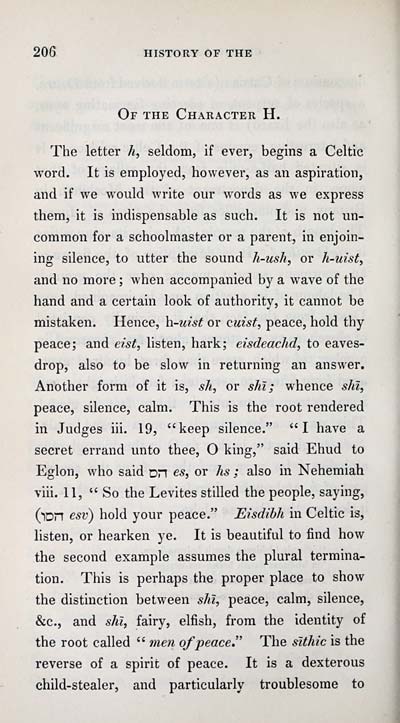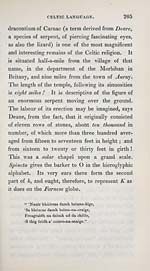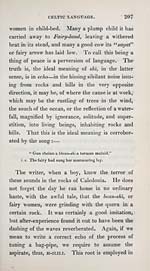Download files
Complete book:
Individual page:
Thumbnail gallery: Grid view | List view

206 HISTORY OF THE
Of the Character H.
The letter h, seldom, if ever, begins a Celtic
word. It is employed, however, as an aspiration,
and if we would write our words as we express
them, it is indispensable as such. It is not un-
common for a schoolmaster or a parent, in enjoin-
ing silence, to utter the sound h-ush, or h-uist,
and no more ; when accompanied by a wave of the
hand and a certain look of authority, it cannot be
mistaken. Hence, h-uist or Quist, peace, hold thy
peace; and eist, hsten, hark; eisdeachd, to eaves-
drop, also to be slow in returning an answer.
Another form of it is, sh, or shl; whence shì,
peace, silence, calm. This is the root rendered
in Judges iii. 19, "keep silence." "I have a
secret errand unto thee, O king," said Ehud to
Eglon, who said dh es, or hs ; also in Nehemiah
viii. 11, " So the Levites stiUed the people, saying,
(iDn esv) hold your peace." Eisdibh in Celtic is,
listen, or hearken ye. It is beautiful to find how
the second example assumes the plural termina-
tion. This is perhaps the proper place to show
the distinction between shi, peace, calm, silence,
&c., and shl, fairy, elfish, frora the identity of
the root called " men ofpeace." The slthic is the
reverse of a spirit of peace. It is a dexterous
child-stealer, and particularly troublesome to
Of the Character H.
The letter h, seldom, if ever, begins a Celtic
word. It is employed, however, as an aspiration,
and if we would write our words as we express
them, it is indispensable as such. It is not un-
common for a schoolmaster or a parent, in enjoin-
ing silence, to utter the sound h-ush, or h-uist,
and no more ; when accompanied by a wave of the
hand and a certain look of authority, it cannot be
mistaken. Hence, h-uist or Quist, peace, hold thy
peace; and eist, hsten, hark; eisdeachd, to eaves-
drop, also to be slow in returning an answer.
Another form of it is, sh, or shl; whence shì,
peace, silence, calm. This is the root rendered
in Judges iii. 19, "keep silence." "I have a
secret errand unto thee, O king," said Ehud to
Eglon, who said dh es, or hs ; also in Nehemiah
viii. 11, " So the Levites stiUed the people, saying,
(iDn esv) hold your peace." Eisdibh in Celtic is,
listen, or hearken ye. It is beautiful to find how
the second example assumes the plural termina-
tion. This is perhaps the proper place to show
the distinction between shi, peace, calm, silence,
&c., and shl, fairy, elfish, frora the identity of
the root called " men ofpeace." The slthic is the
reverse of a spirit of peace. It is a dexterous
child-stealer, and particularly troublesome to
Set display mode to: Large image | Transcription
Images and transcriptions on this page, including medium image downloads, may be used under the Creative Commons Attribution 4.0 International Licence unless otherwise stated. ![]()
| Early Gaelic Book Collections > Hew Morrison Collection > Adhamh agus Eubh, no Craobh Sheanachais nan Gàël > (336) |
|---|
| Permanent URL | https://digital.nls.uk/76900738 |
|---|
| Description | A selection of items from a collection of 320 volumes and 30 pamphlets of literary and religious works in Scottish Gaelic. From the personal library of Hew Morrison, the first City Librarian of Edinburgh. |
|---|
| Description | Selected items from five 'Special and Named Printed Collections'. Includes books in Gaelic and other Celtic languages, works about the Gaels, their languages, literature, culture and history. |
|---|

